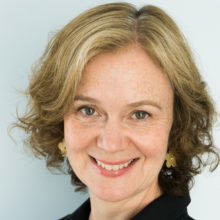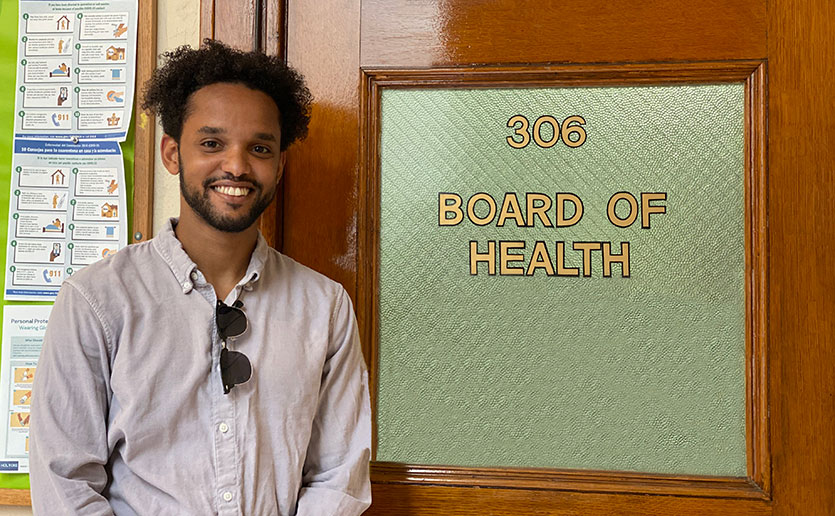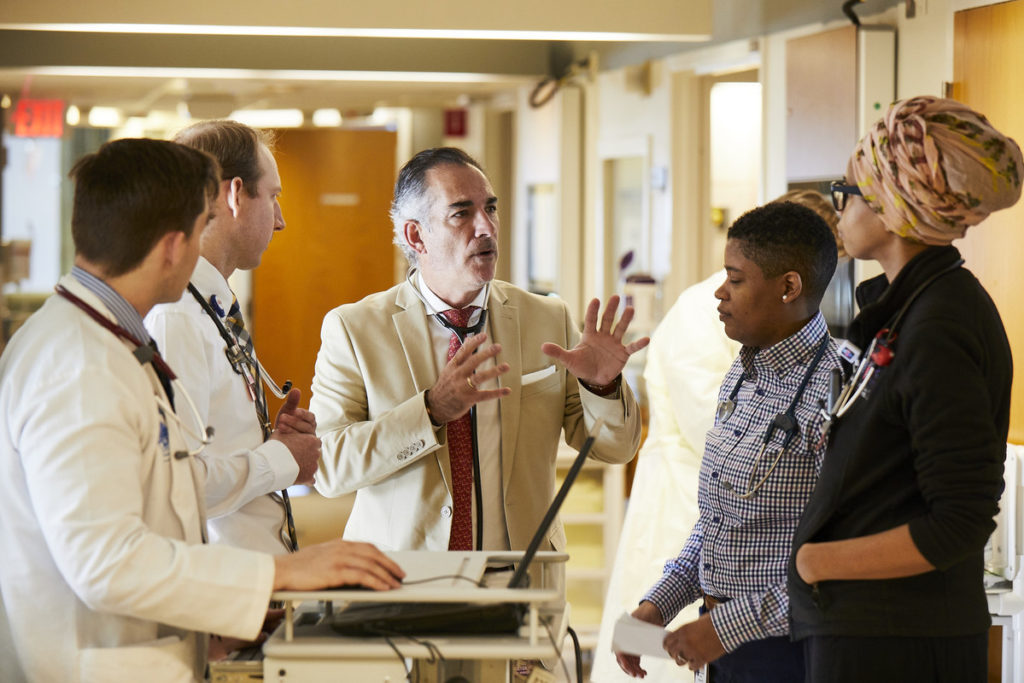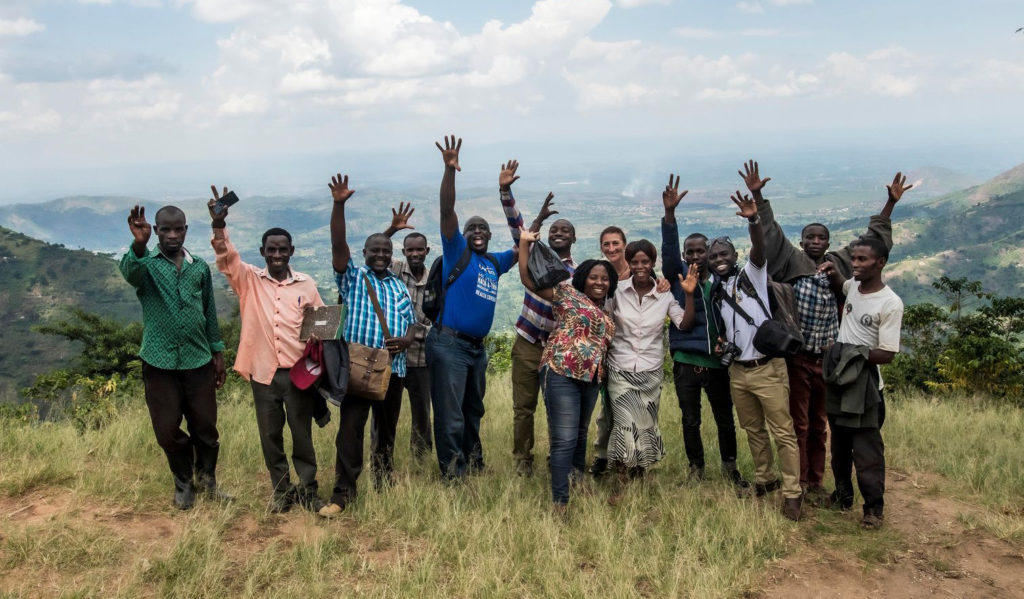In the spring during the peak of the COVID-19 pandemic in Massachusetts, Harvard Medical student Ahmed Elnaiem saw firsthand how equity issues affected residents in Holyoke, one of the poorest cities in the state.
Ahmed’s interest in social justice stems from his own childhood.
Ahmed’s interest in social justice stems from his own childhood. His passion for exploring medicine’s role in addressing inequities led him to his mentor, Louise Ivers, MD, executive director of the Center for Global Health at Massachusetts General Hospital.
Policymakers often turn to Dr. Ivers, a public health expert, during crisis situations. When Holyoke public officials asked Dr. Ivers for support in fighting COVID-19, she called upon Ahmed who had just returned from a Doris Duke International Clinical Research Fellowship in Haiti.
Learning of Inequity Early
Ahmed was born in Omdurman, Sudan, a city on the Nile River. But because his father was completing his graduate education, his family moved between Sudan and England often during his childhood.
He recalls, “In England, our life was quaint, orderly and bucolic. In Sudan, facing dire economic conditions amid the African continent’s longest civil war — it felt life could not have been more different.”
In a resource-limited and inequitable healthcare system accessible only to Sudan’s elites, Ahmed saw family members succumb to bouts of malaria, diarrheal disease and unmanaged cardiovascular disease.
His politically active extended family set an example that encouraged him to help people society overlooked. His interest in science drew him to medicine, where he has advocated for the rights of DACA recipients and employment opportunities for formerly incarcerated people.
On the Ground in Holyoke
Before Ahmed arrived in Holyoke, city officials had recruited local school nurses to aid with contact tracing by identifying and calling residents to alert them of their exposure to COVID-19. They asked people to get tested and quarantine.
Officials plan to use the dashboard Ahmed helped to develop to identify COVID-19 hotspots and send additional resources.
“The city was taking COVID-19 very seriously, and, with the limited capacity that they had, they were doing a really good job,” Ahmed says.
Ahmed spent his first few weeks as a public health contact tracer and learned how difficult it was to get people to answer their phones and ask them personal health questions.
Working with local officials, Ahmed helped to develop a dashboard to track COVID-19 trends in Holyoke. Officials plan to use the information to identify hotspots, so they can send additional resources — to reduce the virus’s spread.
Ahmed also laid the foundation for a serosurvey where a blood test is given to a random sample of the population to determine how factors like ethnicity and age affect exposure to an infectious disease. The test uses antibodies to note COVID-19 exposure.
Survey findings will provide a truer sense of COVID-19 exposure because of biases in who gets tested, including access to health care, Ahmed explains.
Inequity in Holyoke
Historically, Holyoke, located in western Massachusetts, was known as the paper-making capital of the world, and the town’s livelihood centered around it. But the loss of that industry and shift of resources to larger cities has led to continued high unemployment.
In the United States, COVID-19 has inflicted disproportionate harm and suffering on historically oppressed and marginalized populations, including Latinx communities. About half of Holyoke’s population of 40,000 is Latinx. Some families fled Puerto Rico in 2017 after Hurricane Maria devastated the island. Low wages and lack of opportunity have forced many Latinx families into crowded living conditions, making physical-distancing difficult. And because many Latinx individuals work in health care and service industries, they cannot work from home to reduce exposure to the virus.
Working Together
Dr. Ivers says it has been a privilege to work with the Holyoke’s mayor’s office and Board of Health.

“From the beginning of the epidemic, local organizations and local boards of health have been involved in contact-tracing in Massachusetts,” she says. “They know their communities the best, they understand the nuances of people’s lives and they can engage folks in a way that meets them where they are.”
Ahmed felt inspired by the people he met in Holyoke. “This was exactly the kind of public health work that motivated me to be a doctor and advocate on behalf of, and work to improve, the reality of life for people in vulnerable communities,” he says.
“It has been a privilege to work with the Holyoke mayor’s office and Board of Health.”
In the summer, while Ahmed completed medical rotations, Wilfredo Matias, MD, of Brigham and Women’s Hospital, took over as the liaison to the program. Dr. Matias continues to advance the Holyoke work in collaboration with the Board of Health.
Ahmed plans to return to Holyoke this fall to continue addressing COVID-19 in partnership with the local community. The work in Holyoke has been supported by the Center for Global Health through a gift from the Sullivan Family Foundation.
To make a donation to support Mass General’s global health programs, please contact us.
In a statement on the MassLive website, Holyoke Mayor Alex Morse said, “Our local staff has worked tirelessly since February to keep ahead of this pandemic. The external support from the team at Harvard and Massachusetts General Hospital has allowed our city’s response to be more data-driven and effective. Perhaps more important than the improved planning and analysis, are the values and attitude that drive Dr. Ivers’ team and which Ahmed demonstrated during his time here in Holyoke. If our future doctors and public health officials show the same level of collaborative spirit, empathy and propensity for health equity and justice as Ahmed, then there is a lot to be optimistic about.”


